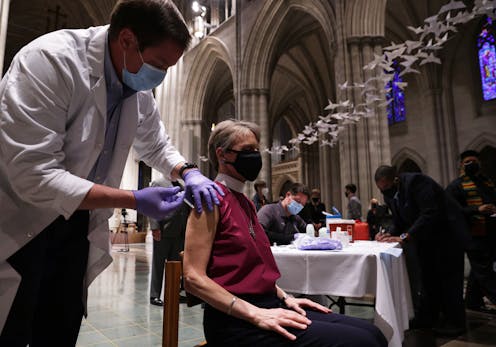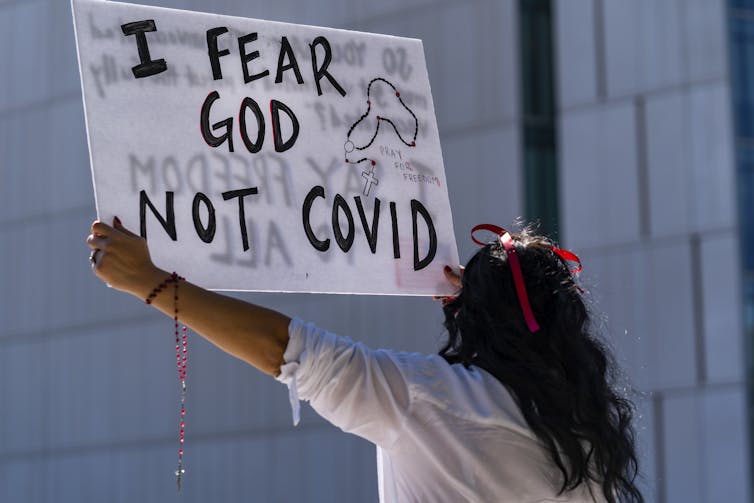
Vaccinating a substantial portion of society has been found to be the best way to bring the COVID-19 pandemic under control, but the pace of vaccination has slowed down since the vaccines were first made available to the public in December 2020. As of May 2022, only 66% of the eligible population in the United States was fully vaccinated, even as vaccines were going unused around the country.
Some groups, such as political conservatives, rural residents and evangelical Christians, are less likely to get vaccinated. Low vaccination rates could lead to more deaths and prolong the pandemic.
Experts believe that effective public health messages are needed to encourage people to receive a COVID-19 vaccination. People are more likely to follow advice if it comes from someone they can trust.
As political scientists, we found in our recent study that religious leaders are more effective messengers than medical and political leaders.
Religious leaders and COVID-19 messaging
In April 2021, we surveyed 709 unvaccinated registered voters in South Dakota, a state with a large proportion of Republican voters, rural residents and evangelical Christians.
We wanted to find out whether public health messaging from three different types of leaders – political leaders, medical leaders or religious leaders – might increase the willingness of the unvaccinated population to receive a COVID-19 vaccine. We also wanted to find out which messenger would be most successful in delivering this message.
As a part of the survey, we conducted what social scientists call a “survey experiment,” which is similar to experiments that scientists conduct in laboratories. Participants were randomly assigned into one of four groups: three treatment groups and one control group.
Participants in each of the treatment groups received an identical message encouraging COVID-19 vaccination. This message came either from a political leader, medical leader or a religious leader from South Dakota.
For scientific validity, participants in the fourth group read a short message unrelated to the COVID-19 pandemic (similar to a placebo in a clinical trial). Afterward, all participants answered the same question about their vaccination intentions.
We found that of the three messengers, only the religious messenger succeeded in pushing the interest of the unvaccinated toward getting the shot. Compared to the participants in the control group, those who received a message from the religious leader showed a 12% greater likelihood of getting vaccinated. We also saw that messaging from a religious leader increased evangelical Christians’ interest in getting vaccinated by 14% compared with those in the control group.

Conversely, we found that the same message delivered by both the medical and political leaders failed to persuade the unvaccinated population to receive a COVID-19 vaccine. When we asked every respondent about their interest in learning more about the vaccines, we found a backlash against the medical messenger. Compared with the control group, respondents who received an encouragement from the medical messenger were 9% less likely to seek out information about vaccines.
A reason for cautious optimism?
The good news of our study is that attitudes toward vaccination are not set and the vaccine-hesitant are responsive to certain kinds of encouragements.
Our findings are in line with existing studies that showed the high levels of trust clergy enjoy in the society. For example, a Pew survey conducted last year reported that over 60% of congregants have at least “a fair amount” of confidence in their religious leaders to provide guidance about getting a COVID-19 vaccine. The Pew survey also found that the congregants’ confidence in state and local elected officials as well as news media was lower – at 50% and 41%, respectively. A scientific study found that a religious message from an evangelical leader led more evangelicals to see wearing face masks as important.
Discouragingly, we found that messaging from medical leaders had little to no effect. Our data shows that this is largely attributed to the politicization of the COVID-19 pandemic. Unfortunately, public health authorities in particular have become part of the political skirmish surrounding vaccination.
For example, Anthony Fauci, director of the National Institute of Allergy and Infectious Diseases and chief medical adviser to the president, and other scientists have been repeatedly criticized by several Republican politicians, including former President Donald Trump. It is likely that many among those who are unvaccinated may not heed scientists’ advice about COVID-19 vaccines.
Overall, the findings of our study should be interpreted as cautious optimism. COVID-19 vaccine hesitancy is challenging to overcome, but we argue that there are ways to break through some of the hesitancy and skepticism.
The authors do not work for, consult, own shares in or receive funding from any company or organisation that would benefit from this article, and have disclosed no relevant affiliations beyond their academic appointment.
This article was originally published on The Conversation. Read the original article.







